TL;DR
Scientific data suggests it takes 150 to 300 hours to get to the intermediate level in French if you're learning it as a second language. If you're learning it as a foreign language, then expect to spend 600 to 750 hours of practice to reach a professional level.
Many things affect your ability to learn and speak French fluently. Some of the key factors include your native language , age , motivation , aptitude , and the quality of courses .
And according to research, to optimize your French learning efforts, you have to balance input (listening/reading), output (speaking/writing), deliberate study, and the development of fluency and automaticity.
In this article, we'll cover how long does it take to learn French if you're learning it as a new language (second or foreign).
🇫🇷 Learn From Meghan's Mistakes!
Meghan spent months trying out techniques like vocabulary memorization, spaced repetition, and gamification apps like Duolingo. None of it worked, instead it ended up being total waste of time and money. She had a breakthrough only after discovering Get French Classes where she went through our active immersion, that helped her:
-
build the daily habits of speaking French,
-
practice under real-life scenarios through private French classes,
-
improve fluency through group classes with other French learners.
Join one of our French courses and start speaking French today.
How long does it take to learn French as a second language?
Second language learning refers to the process of learning a new language in an environment where that language is the primary means of communication.
For French, this would mean learning the language in a French-speaking country, such as France, Belgium, or Canada (Quebec). In this context, you are immersed in the language and have a lot of opportunities to hear, speak, read, and write French in authentic situations.
Learning French as a second language offers several advantages that can accelerate the acquisition process.
Firstly, you are exposed to a rich and varied input of the language, which is essential for developing proficiency.
According to Stephen Krashen's input hypothesis , language acquisition occurs when you receive comprehensible input that is slightly beyond your current level of understanding.
The immersive environment of second language learning provides a constant stream of input that helps you progress naturally.
Secondly, as a second language learner, you have a lot of opportunities to practice in real-life situations. Think about situations like ordering food, asking for directions, or engaging in conversations with native French speakers.
This real-life and first-hand practice is excellent for developing your speaking skills and building confidence in the language.
A study by Isabelle Degache ( 2006 ) found that learners who participated in a French immersion program in Quebec showed significant improvements in their speaking and listening skills compared to those who learned French in a traditional classroom setting.
What’s the time to proficiency for second language learners?
Language learning institutions estimate that the time required to reach a specific targeted proficiency level based on the Common European Framework of Reference for Languages (CEFR) is between 60 and 1,200 hours.
The CEFR is a widely recognized scale that defines six levels of language proficiency, from A1 (beginner) to C2 (mastery).
For French learners in an immersive environment, the Alliance Française, a well-known French language school , suggests the following time estimates for each CEFR level:
-
A1 (beginner) : 60-100 hours of instruction
-
A2 (elementary) : 160-200 hours of instruction
-
B1 (intermediate) : 360-400 hours of instruction
-
B2 (upper intermediate) : 560-650 hours of instruction
-
C1 (advanced) : 810-950 hours of instruction
-
C2 (mastery) : 1060-1200 hours of instruction

Keep in mind that these estimates assume ideal learning conditions. They suppose that you're learning through full immersion and intensive study . And so, individual factors, such as age, aptitude, and motivation , can significantly impact the time you take to reach each level.
Francois Grosjean ( 1982 ) examined the language acquisition of adults who moved to a French-speaking country and received formal lessons.
The study found that, on average, adults learners reached a near-native level of proficiency within 5 years.
However, the time required for individual learners varied significantly:
-
Some learners achieved near-native proficiency in as little as 2-3 years .
-
Other learners achieved the same level in 10 years .
This study also points to the variability in second language acquisition timelines, even among learners who are fully immersed in the target language environment.
What factors affect your French as a second language learning speed?
Age of the learner
Several studies have shown that children acquire languages more quickly and easily than adults, especially when it comes to developing native-like pronunciation and mastering grammatical structures .
For example, The Critical Period Hypothesis , which contends that there is a biological opportunity window for language acquisition that gradually closes as a person reaches puberty, frequently explains this phenomenon.
During your adolescent and teen ages, your brain is more plastic and receptive to language input, and this is what allows children to acquire languages more naturally and effortlessly.
However, you need to understand that the implication is not that adults can't learn fast and excellently. Adults can still learn French fluently, albeit through different mechanisms.
From our experience, adult learners benefit more from explicit learning materials and programs, focusing on language rules and structures, and engaging in stress-free, interactive practice to improve their proficiency.
Intensity of exposure to French
Learners who are fully immersed in a French-speaking environment like living with a French-speaking host family or working in a French-speaking workplace, typically progress more rapidly than those who have limited exposure to the language.
Language learning schools or platform that offer immersive experiences provide you with native-like opportunities to hear, speak, read, and write French in authentic contexts. This allows you to fast-track your French language learning journey more effectively.
For example, a study conducted by Barbara Freed ( 1995 ) compared the oral proficiency gains of leaners who studied French abroad in France with those who studied French only in the classroom setting.
The study found that learners who studied abroad made significantly greater progress in their speaking skills owing to the intensive exposure to the target language.
This intensity of exposure can also be achieved through various means, such as:
-
Attending intensive language courses or immersion programs
-
Participating in language exchanges or conversation groups
-
Consuming French media (e.g., movies, watch French TV shows, podcasts, books)
-
Engaging in online language learning communities or forums
Quality of classes and learning strategies
The quality of the language classes and the learning strategies you employ can also significantly impact how fast and effectively you learn your second language.
Effective second language classes should provide a balance of input (exposure to the language), output (opportunities to use the language), and feedback (guidance and correction), as well as opportunities for meaningful communication and interaction.
Learning approaches that prioritize your listening comprehension and speaking abilities, such as situation-based language teaching or content-based classes, can help you develop your language skills more efficiently.
Furthermore, incorporating a variety of teaching methods and materials, such as audio-visual resources, written materials, and interactive activities, caters to different learning styles and keep learners motivated and engaged.
Learners who actively engage in the learning process and employ effective learning strategies tend to progress more rapidly in their language acquisition.
Some key strategies that can enhance learning include:
-
Setting clear, achievable goals and monitoring progress
-
Seeking out extra learning materials, resources and opportunities for practice
-
Using strategies like self-reflection and self-evaluation
-
Employing memory techniques like mnemonics or spaced repetition
-
Engaging in active listening and reading, focusing on key ideas and structures
-
Practicing regularly and consistently, even in short bursts
How long does it take to develop French language skills for second language learners?
You need to consider the development of each language skill: reading, writing, listening, and speaking.
What are time estimates for achieving proficiency in reading, writing, listening, and speaking?
Estimates for the time required to achieve proficiency in each skill vary widely, but as a general guideline:
-
Reading : 200-300 hours of study for basic level proficiency, 500-600 hours for advanced proficiency
-
Writing : 300-400 hours of study for basic proficiency, 600-800 hours for advanced proficiency
-
Listening : 200-300 hours of study for basic proficiency, 500-600 hours for advanced proficiency
-
Speaking : 300-400 hours of study for basic proficiency, 600-800 hours for advanced proficiency
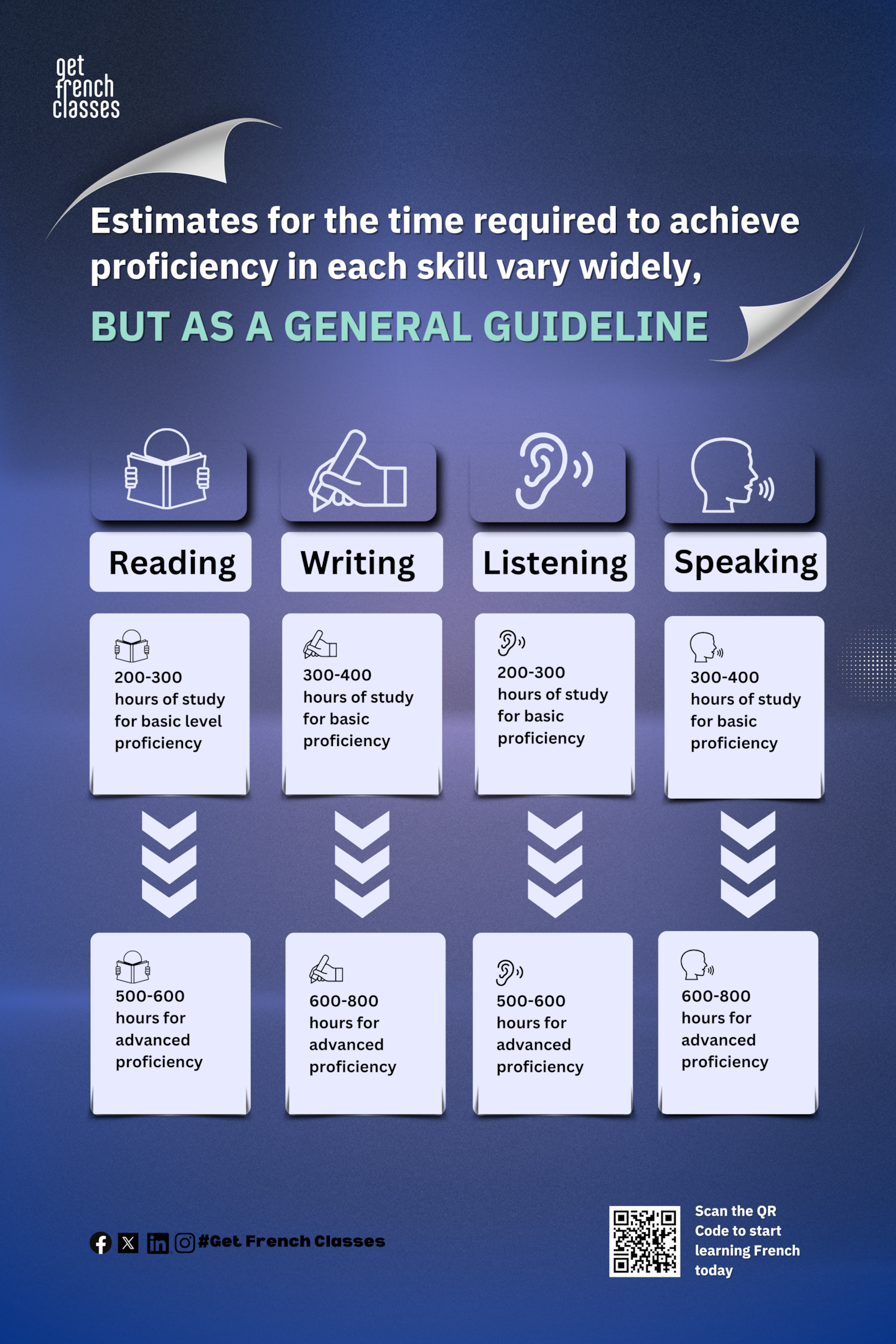
However, the time required to achieve proficiency in each language skill can vary depending on the learner's strengths, weaknesses, and learning goals. However, research has shown some general trends:
-
Receptive skills (reading and listening) develop more quickly than productive skills (writing and speaking). This is because learners often understand more than they produce, and they can draw on their existing knowledge and context to understand.
-
A study by Keiko Koda ( 2005 ) found that second language learners often achieve higher levels of reading proficiency compared to their oral proficiency, particularly in academic settings. That's because reading allows you to process language at your own pace and refer back to the text as needed, while speaking requires real-time processing and production.
What does data say about the relative difficulty and learning curves for each skill?
Each language skill presents its own challenges and learning curves for second language learners, particularly when their native language differs significantly from French:
-
Pronunciation and spelling : French pronunciation and spelling can be particularly challenging for a native English speaker (though english pronunciation isn't as hard for native French speakers) due to the many silent letters and complex sound-spelling correspondences.
A study by Henriette Hendriks ( 1999 ) found that Dutch learners of French struggled more with pronunciation than with grammar or vocabulary.
-
Grammar : French grammar rules can be complex, particularly because of features like gendered nouns, verb conjugations, and agreement rules that may not exist in the learner's native language.
However, learners who are familiar with another Romance language , like Spanish or Italian , may find French grammar rules more accessible.
-
Vocabulary : The numerous cognates that English and French share, particularly in academic and technical domains, can make learning French vocabulary easier.
However, learners must also be aware of false cognates and idiomatic expressions that do not translate directly.
-
Writing : Writing in French may be less challenging for learners who are already literate in another Romance language, as they can draw on their existing knowledge of similar grammatical structures and vocabulary. However, learners must still master French-specific conventions, such as punctuation and formatting.
🇫🇷 Learn From Meghan's Mistakes!
Meghan spent months trying out techniques like vocabulary memorization, spaced repetition, and gamification apps like Duolingo. None of it worked, instead it ended up being total waste of time and money. She had a breakthrough only after discovering Get French Classes where she went through our active immersion, that helped her:
-
build the daily habits of speaking French,
-
practice under real-life scenarios through private French classes,
-
improve fluency through group classes with other French learners.
Join one of our French courses and start speaking French today.
How long does it take to learn French as a foreign language?
Foreign language learning refers to the process of learning a language that is not commonly spoken in the learner's native environment.
For instance, an American studying French in the United States or a Japanese student learning French in Japan would be considered foreign language learners. In this context, exposure to the target language is often limited to the classroom or dedicated study time.
What’s the time for proficiency for foreign French learners?
The U.S.'s Foreign Service Institute (FSI), which trains diplomats and government personnel, classifies French as a Category I language, meaning that it's relatively easy for native English speakers to learn it.
According to FSI estimates, achieving professional working proficiency in French , equivalent to Level 3 on the Interagency Language Roundtable (ILR) scale, takes learners about 600–750 class hours, or 24–30 weeks of full-time study .
This estimate is based on the FSI's intensive language training program, which offers 25 hours of classroom program per week in addition to self-study materials and practice opportunities.
Similarly, the Alliance Française, an international organization promoting French language and French culture, suggests that reaching a B2 level on the CEFR scale, considered an upper-intermediate level, takes around 560-650 hours of learning for foreign language learners.
This estimate supposes that you take your lessons in a structured, immersive learning environment with regular exposure to French both inside and outside the classroom.
While these institutional estimates provide valuable benchmarks, let's also look at research studies that investigate foreign languages acquisition timelines in various learning contexts and their unique findings.
For example, Carroll ( 1967 ) found that American students studying French for approximately 3 hours per week in a classroom setting took an average of 4 years to reach an intermediate level of proficiency. This study highlights the importance of consistent, long-term study in achieving significant progress, even in a traditional classroom environment.
More recently, Rifkin ( 2003 ) investigated the language acquisition of American university students majoring in French.
The study found that it took students an average of 3.5 years to reach an ACTFL Advanced Low level , which is defined by the capacity to handle informal and some formal conversations.
However, the study also noted individual variations, with some learners taking up to 5 years to attain the same level.
These research findings underscore the complexity of the language acquisition process and the potential impact of individual factors on learning timelines.
Language aptitude, motivation, intensity of lessons, and opportunities for immersion and practice all influence the time it takes you to reach specific proficiency levels.
For instance, a highly motivated learner taking an intensive language program like the one offered by the FSI, will most likely achieve professional working proficiency in French within 6 months of full-time study.
Conversely, a French learner in a traditional classroom setting with limited weekly exposure and who particularly limits their learning efforts to what's provided to them in the program, will most likely need several years of study to reach an intermediate level.
Furthermore, we've seen that learners' individual goals and definitions of proficiency vary a lot, and all this contribute affecting the overall time it takes them to reach their desired level. It's simple logic actually.
Take for example a learner who is looking to achieve basic conversational skills for traveling purposes. It will likely take them less time to reach their goal than a learner seeking advanced proficiency for academic or professional use.
What factors affect foreign French learning speed?

The learner’s native language
One of the most significant factors that influence the speed of French learning is the learner's native language.
As a native speaker of English, you may often find French relatively easy to learn due to the high number of cognates and shared vocabulary (and also traditional as well as pop culture) between the two languages.
English and French share a significant portion of their lexicon, with many words having similar spellings and meanings, such as " information ," " conversation ," and " restaurant ."
This linguistic overlap allows English speakers to more easily recognize and acquire French vocabulary, and it helps accelerate their progress in the early stages of learning.
Similarly, native speakers of other languages like Spanish and Italian , often progress more quickly in French due to the structural and lexical similarities among these languages.
For example, Spanish and French share many grammatical features, including the use of gendered nouns and similar verb conjugation patterns. This linguistic proximity enables Spanish and Italian speakers to transfer their existing language knowledge to French, which facilitates a more rapid acquisition process. So, if you're a native Spanish speaker, don't hold on your French learning goals.
Conversely, learners whose native languages have little in common with French , such as Arabic or Chinese , find it harder to master the language. These learners must navigate significant differences in grammar, syntax, and writing systems , which pose additional challenges and slow down their progress. If you speak similar languages like Turkic, you might face similar difficulties.
For instance, Arabic speakers may struggle with French vowel sounds and the use of articles, while Chinese speakers may find the French writing system and verb conjugations particularly challenging.
The learner’s motivation and momentum
Maintaining motivation throughout the language learning journey is also essential for your progress. Setting clear, achievable goals, creating a supportive learning environment, and fostering a sense of autonomy help learners stay motivated and engaged.
For example, learners who track their progress, celebrate their successes, and actively seek opportunities to use French in contexts are more likely to maintain their motivation and make rapid progress.
In addition to classroom instruction, learners who actively seek out opportunities for authentic language practice and immersion tend to progress more quickly.
Engaging in activities such as reading French books, watching French movies and TV shows, listening to French podcasts, and interacting with native speakers provide valuable exposure to the language and culture. And it all results in faster learning cycles.
Lessons/Classes quality
The quality of the language courses and the learning strategies employed by the teacher or tutor also play a significant role in how fast the learner assimilates things and masters the language.
For example, teaching learners how to effectively use resources such as dictionaries, mnemonic devices, and language learning apps can enhance their ability to acquire and retain French vocabulary and grammar.
Instructional approaches that prioritize conversational ans speaking skills, provide learners with good opportunities for practice, and offer meaningful feedback that can also speed up their learning progress and even enhance their experience.
Communicative language teaching, which focuses on developing learners' ability to use French for authentic communication, has been shown to be particularly effective in promoting rapid acquisition.
By engaging learners in tasks that simulate real-life language use (think role-plays, discussions, and problem-solving activities) communicative approaches help learners develop their language skills in context and foster a more natural, fluent use of French.
What are proficiency benchmarks for foreign language learners?
According to language learning experts, reaching the ACTFL Intermediate Low to Mid level, which roughly corresponds to CEFR A2 to B1, typically requires 150–300 hours of courses .
At this level, learners can handle basic conversation in familiar contexts. Things like asking and answering simple questions, discussing preferences, and describing their immediate environment.
To achieve the ACTFL Advanced Low to Mid Level (CEFR B2 to C1), learners usually need 400–700 hours of learning time . This level enables more complex interactions, such as narrating events, expressing opinions, and having extended conversations on all sorts of topics.
Getting the highest level of proficiency, ACTFL Superior (CEFR C2), can take over 1,000 hours and significant immersion experiences.
At this level, learners demonstrate near-native proficiency, effectively communicating in personal and professional contexts, understanding subtle nuances, and expressing themselves fluently and precisely.
How long does it take to develop French language skills for foreign language learners?
Reading proficiency at the ACTFL Intermediate High level, which level at which learners ae able to effectively digest written materials — understanding the main ideas and some supporting details in authentic texts — may require 150–300 hours of learning time .
Achieve that level in the specified time period means that the learner learns through a combination of intensive classroom study and extensive reading practice.
And writing proficiency at the same level may take 300–500 hours . Intermediate High writing skills means being able to compose simple, coherent texts on familiar topics, express thoughts and opinions, and provide basic descriptions and narratives.
Listening comprehension could take 300–500 hours of instruction to reach the ACTFL Intermediate High level. At this level, learners understand ideas and some supporting details in spoken language on familiar — only those delivered at a normal rate of speech.
Finally, speaking proficiency at the intermediate-high level can take between 400–600 hours . This level enables learners to handle simple conversations, and express themselves with relative ease on familiar topics.
How long does it take to acquire French vocabulary and grammar?
How long does it take to acquire French vocabulary?
Research suggests the following estimates for the number of French words needed at different CEFR proficiency levels to be fluent:
-
A1 (Beginner) : 500-1,000 words
-
A2 (Elementary) : 1,000-2,000 words
-
B1 (Intermediate) : 2,000-4,000 words
-
B2 (Upper Intermediate) : 4,000-8,000 words
-
C1 (Advanced) : 8,000-16,000 words
-
C2 (Mastery) : 16,000+ words
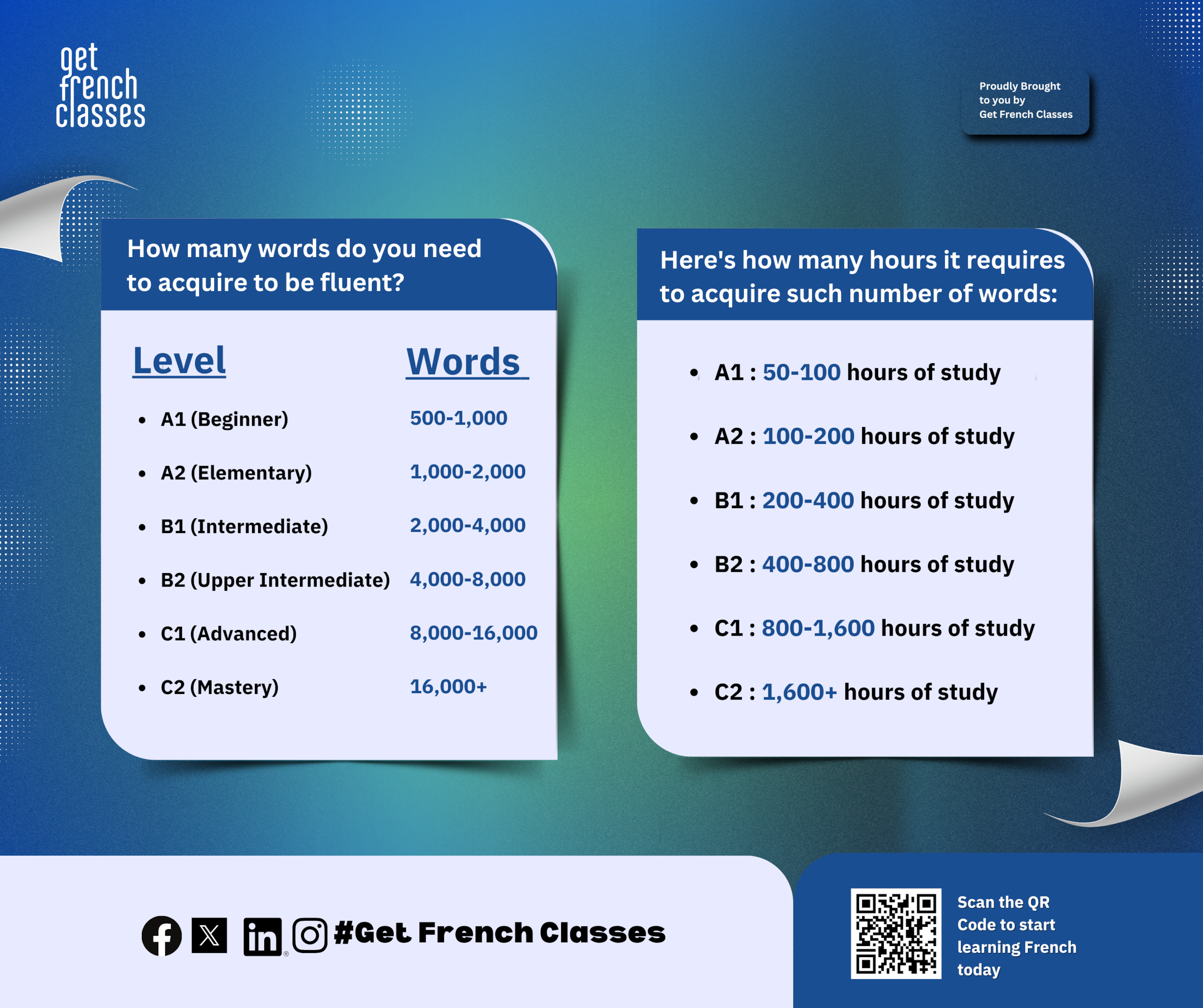
The time it takes to learn the necessary vocabulary words and full French sentences for each proficiency level varies depending on factors such as the learner's native language, prior language learning experience, and learning habits.
However, research suggests the following rough estimates:
-
A1 : 50-100 hours of study
-
A2 : 100-200 hours of study
-
B1 : 200-400 hours of study
-
B2 : 400-800 hours of study
-
C1 : 800-1,600 hours of study
-
C2 : 1,600+ hours of study
The best tactics to achieve is through the use of flashcards or word lists and engaging in activities like reading, listening, and interaction.
High-frequency words are those come most often in the language and are essential for basic communication. In French, the top 100 most frequent words account for approximately 50% of all words in written texts, while the top 1,000 words cover around 70-80% .
As a learner, you should focus on high-frequency words early in your language learning journey, as these words will provide you with the foundation you need to understand and produce the language in several contexts.
How long it takes to acquire French grammar?
The order in which learners acquire French grammatical concepts vary depending on the teaching approach and the learner's individual differences.
However, research shows a general sequence of acquisition that can help efficiently design curriculums and teaching practices:
-
Basic word order (subject-verb-object)
-
Present tense of regular and common irregular verbs
-
Articles (definite and indefinite)
-
Adjective agreement (gender and number)
-
Negation (ne...pas)
-
Past tense (passé composé) with avoir and être
-
Future tense (futur simple)
-
Pronouns (subject, direct object, indirect object)
-
Imperative mood
-
Conditional mood
-
Subjunctive mood
-
Relative clauses
-
Passive voice
This order is not fixed, and learners may learn some concepts earlier or later depending on their individual learning styles.
Mastering French grammatical concepts takes time and practice, and the time required vary among learners. However, some rough estimates based on classroom instruction hours are:
-
Basic word order and present tense : 50-100 hours
-
Articles and adjective agreement : 50-100 hours
-
Negation and past tense : 100-150 hours
-
Future tense and pronouns : 100-150 hours
-
Imperative, conditional, and subjunctive moods : 150-200 hours
-
Relative clauses and passive voice : 200+ hours
Learners from different native language backgrounds typically face specific challenges when acquiring French grammar due to differences in linguistic structures and concepts.
Some common difficulties include:
-
English speakers : Verb conjugations, gender agreement, and the use of articles (definite vs. indefinite)
-
Spanish and Italian speakers : False cognates, verb tense differences (e.g., passé composé vs. imperfect), and the use of the subjunctive mood
-
German speakers : Word order differences (e.g., position of the verb in subordinate clauses), and the use of articles (definite vs. indefinite)
-
Chinese and Japanese speakers : Verb conjugations, article usage, and the concept of grammatical gender
-
Arabic speakers : Verb tense differences, the use of articles (definite vs. indefinite), and the placement of adjectives (before vs. after the noun)
How long does it take to learn French compared to other languages?
The U.S. Foreign Service Institute (FSI) categorizes languages into four groups based on their difficulty for native English speakers:
-
Category I (easiest) : French, Spanish, Italian, Portuguese ( 24-30 weeks to reach professional working proficiency)
-
Category II : German, Indonesian ( 36 weeks )
-
Category III : Russian, Vietnamese, Hindi, Persian ( 44 weeks )
-
Category IV (hardest) : Arabic, Chinese, Korean, Japanese ( 88 weeks )
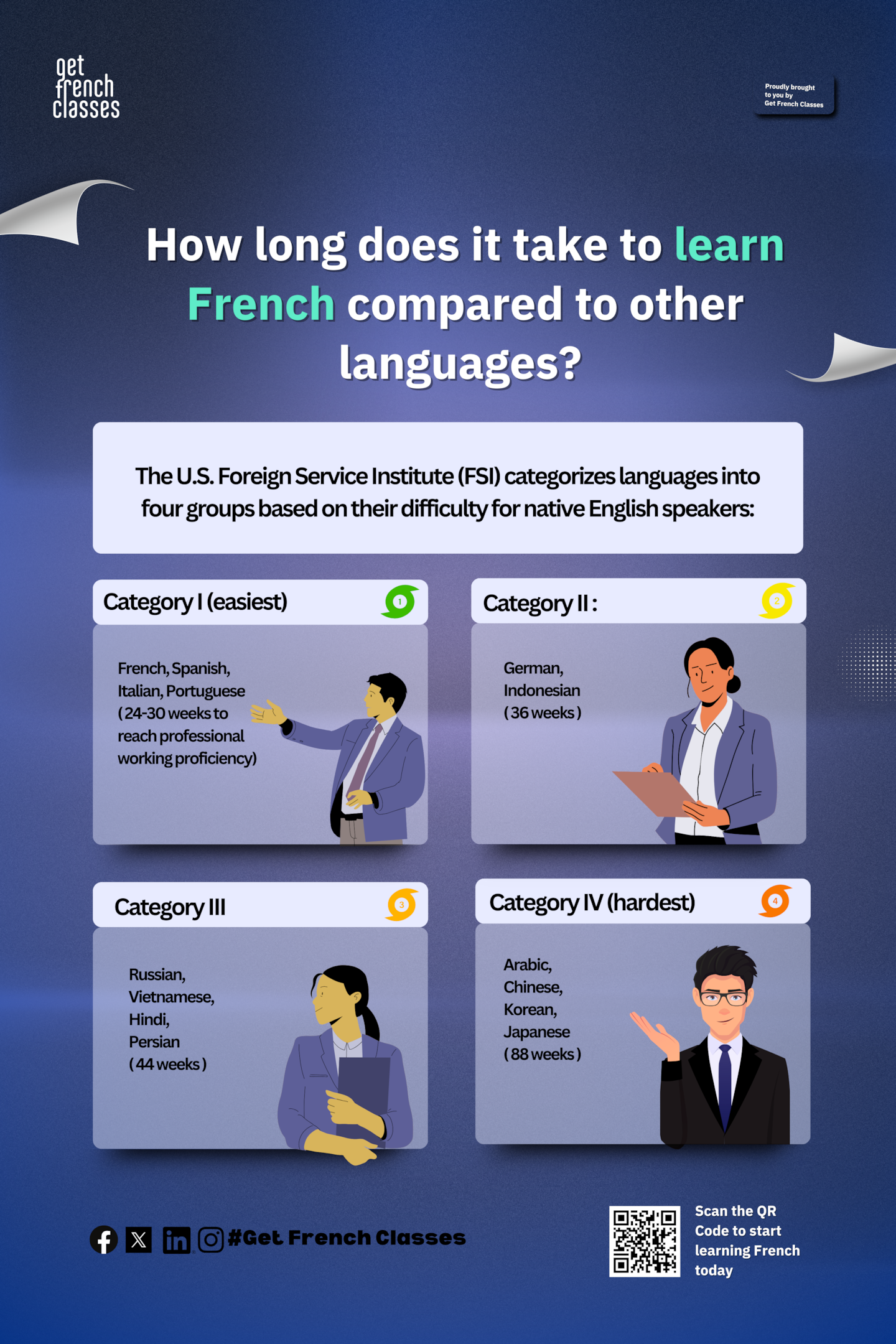
French, as a Category I language, is considered one of the easiest languages for native English speakers to learn. This is due in part to the high number of cognates (words with similar spelling and meaning) shared between French and English, as well as the relative similarity of grammatical structures.
However, it is important to note that these FSI estimates are based on intensive, full-time study ( 25 hours per week ) and may not always reflect the learning timelines of individuals studying in other contexts, such as classroom courses or self-study.
A learner's native language can significantly impact the speed at which they acquire French.
Learners whose native languages are more linguistically similar to French ( e.g., other Romance languages like Spanish or Italian) may progress more quickly than those whose native languages are more distant ( e.g., Arabic or Chinese).
For example, a study by Schachter ( 1974 ) found that native Spanish speakers learning French made fewer errors and progressed more quickly in their acquisition of French verb tenses compared to native Arabic and Persian speakers . This is likely due to the similarities in verb conjugation patterns between Spanish and French.
Similarly, a study by Ringbom ( 2007 ) found that native English speakers learning French benefited from the high number of cognates between the two languages, particularly in the areas of vocabulary acquisition and reading comprehension.
Comparative linguistics research also provide valuable insights into the unique challenges and opportunities that learners from different native language backgrounds may face when acquiring French.
For example, research by Ayoun ( 2007 ) found that native English speakers learning French often struggle with the concept of grammatical gender, as English does not have a similar system.
On the other hand, native Spanish speakers, whose language does have grammatical gender, may find this aspect of French grammar more intuitive.
Similarly, research by Dewaele ( 2002 ) found that native Dutch speakers learning French often struggled with the use of the French subjunctive mood, as Dutch does not have an equivalent structure.
However, native Spanish speakers, whose language does use the subjunctive mood, find this aspect of French grammar more familiar.
How do French learning methods affect the speed of learning?
The most efficient way to quickly reach high levels of proficiency is immersion.
A study by Freed ( 1995 ) found that students who participated in a French immersion program for one semester made significant gains in their oral proficiency compared to those who studied French in a traditional classroom setting.
Classroom courses, particularly when combined with opportunities for authentic language practice and interaction, can also be an effective method for learning French.
A study by VanPatten ( 1993 ) found that learners who took grammar courses in a classroom setting made significant gains in their accuracy and fluency compared to those who did not.
Self-study can also be an effective method for learning French, particularly when combined with other methods such as classroom or immersion. Though it requires a high degree of motivation and self-discipline.
A study by Nielson ( 2011 ) found that learners who engaged in self-study using online language learning resources made significant gains in the areas of vocabulary acquisition and reading comprehension.
The time estimates for achieving French proficiency can vary widely depending on the learning method used. Here are some rough estimates based on research and experience:
-
Immersion : 3-6 months of intensive, full-time study to reach ACTFL Advanced level
-
Classroom instruction : 4-6 years of consistent study (3-4 hours per week) to reach ACTFL Advanced level
-
Self-study : 6–12 months of intensive, full-time study to reach ACTFL Intermediate level; 2-3 years of consistent study (1-2 hours per day) to reach ACTFL Advanced level
Understand that these are based on average learners and may not reflect the experiences of individuals with particular aptitudes or learning challenges. Also, the quality and intensity of course, as well as the learner's motivation and engagement, significantly impact the time it takes to achieve proficiency.
Research suggests that the most effective approach to learning French is a combination of learning strategies that address different aspects of language acquisition, such as:
-
Input : Extensive consumption of French language materials through reading, listening, and interaction with native speakers.
-
Output : Regular opportunities to practice speaking and writing in French, with a focus on conversation and real-world applications.
-
Deliberate study : Courses on French grammar, vocabulary, and pronunciation, with an emphasis on form-meaning connections and contextual learning
-
Fluency development : Activities that promote automaticity and fluency, such as timed reading, repeated listening, and spontaneous conversation practice
A study by Ellis ( 2005 ) found that learners who received a balanced combination of input, output, and form-focused courses made significant gains in their French proficiency compared to those who received only one those key elements.
Similarly, a study by Skehan ( 1998 ) found that learners who engaged in a variety of learning strategies, such as memorization, self-monitoring, and social interaction, were more successful in their French acquisition compared to those who relied on a single strategy.
These findings show that the optimal approach to learning French is a mix of learning methods and strategies that cater to individual learning styles and preferences while providing a balanced and comprehensive language learning experience.
How long can you retain your French vocabulary and fluency?
Research suggests that language retention depends on several factors, like the level of proficiency achieved, the amount of time spent using the language, and the learner's motivation to maintain their skills.
A study by Bahrick ( 1984 ) found that learners who achieved a high level of proficiency ( e.g., ACTFL Advanced or higher) were more likely to retain their skills over time than those who only reached lower levels of proficiency.
The study also found that learners who continued to use French regularly ( e.g., through reading, writing, listening, or speaking) maintained their proficiency and those who did not saw their levels degradate.
Moreover, research by Russell ( 2005 ) suggests that learners who have a strong motivation to maintain their language skills ( e.g., for personal, professional, or academic reasons) are more likely to retain their proficiency over time.
Learners who engage in activities that promote language maintenance, such as participating in conversation groups, reading French books or articles, and watching French media , are more likely to retain their skills than those who do not.
A study by Rifkin ( 2005 ) found that learners who participated in a French immersion program for one year reached an average ACTFL Oral Proficiency Interview (OPI) rating of Intermediate High.
However, learners who participated in a four-year university French program reached an average OPI rating of Advanced Low, suggesting that long-term, consistent study is necessary for achieving higher levels of fluency.
Maintaining fluency in French also requires ongoing material consumption and practice. Learners who continue to use the language regularly after completing their studies are more likely to maintain their skills over time.
A study by Meara ( 2004 ) found that learners who used French for at least one hour per week were more likely to maintain their proficiency than those who used the language less frequently.
To maintain fluency, learners can engage in a variety of activities, such as:
-
Participating in conversation groups or speaking with your language exchange partner
-
Reading French books, articles, or websites
-
Watching French movies, TV shows, or videos
-
Listening to French music or podcasts
-
Writing in French (e.g., journaling, blogging, or correspondence)
-
Traveling to French-speaking countries or regions
By incorporating these activities into their regular routine, learners can continue to develop and maintain their French language skills over time.
Go from “I can understand but can’t speak” to speaking French like a native
You know by now that learning a new language like French is a challenging journey, and it's not uncommon for learners to find themselves in a situation where they understand the language when spoken but struggle to express themselves fluently.
You also know the importance of shifting from passive to active learning. Learning more through functional language chunks, and developing a French-speaking persona to overcome psychological barriers.
As you implement these strategies and incorporate effective speaking practice techniques like shadowing, retelling stories, self-talk, simulated conversations, and working with a tutor or native speaker, you can fast-track your progress toward French fluency.
At Get French Classes, we understand the challenges learners face and have designed our programs to address these issues head-on. That's why we created one of the best French online courses in the market.
Our approach combines personalized tutoring, group practice, and comprehensive online resources to provide you with a well-rounded and effective learning experience.
When you join our French classes , you'll be paired with a certified private French tutor who will guide you through one-on-one sessions tailored to your specific needs and goals and will help you learn French faster. You'll discuss the nuances of the language, get feedback, and practice your skills in a supportive environment.
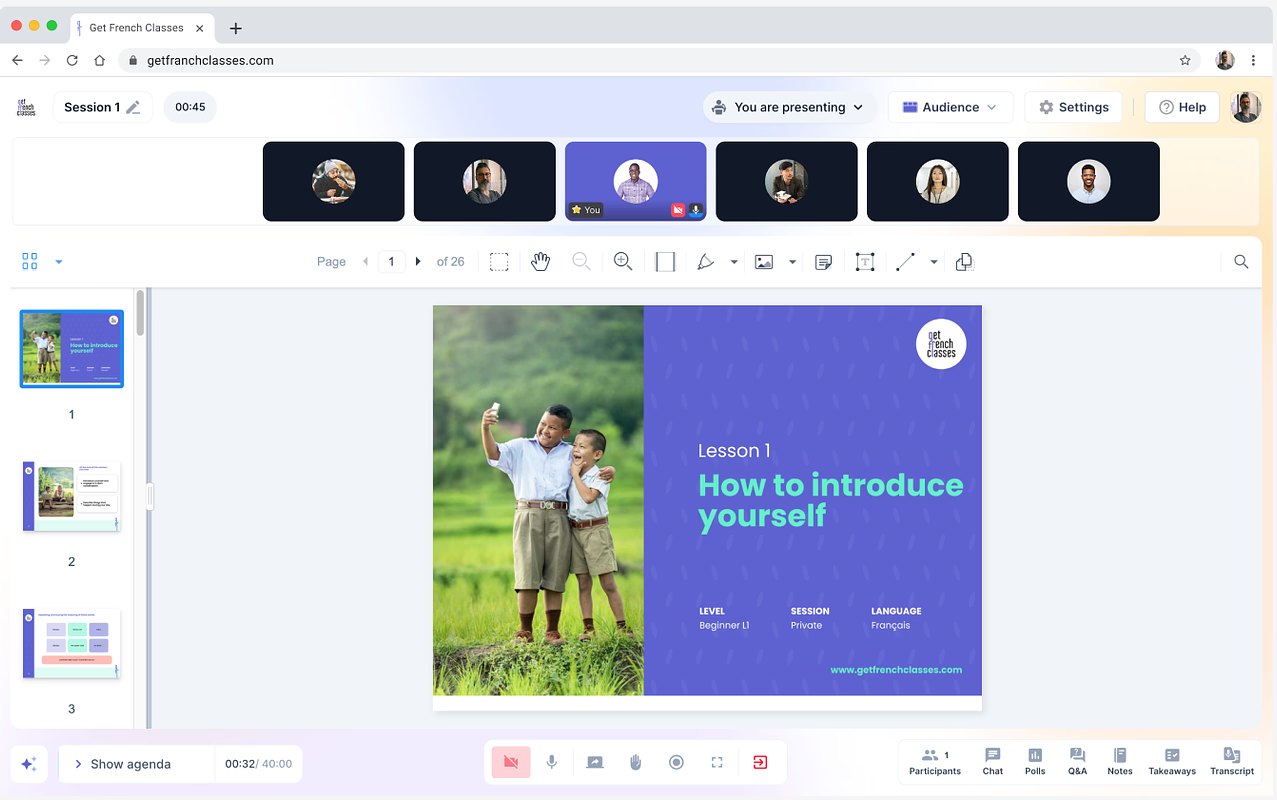
Moreover, our weekly group classes connect you with French-learning buddies from around the world. You'll have the opportunity to hone your conversational skills and learn from your peers as you take part in fun debates, discussions, and activities.
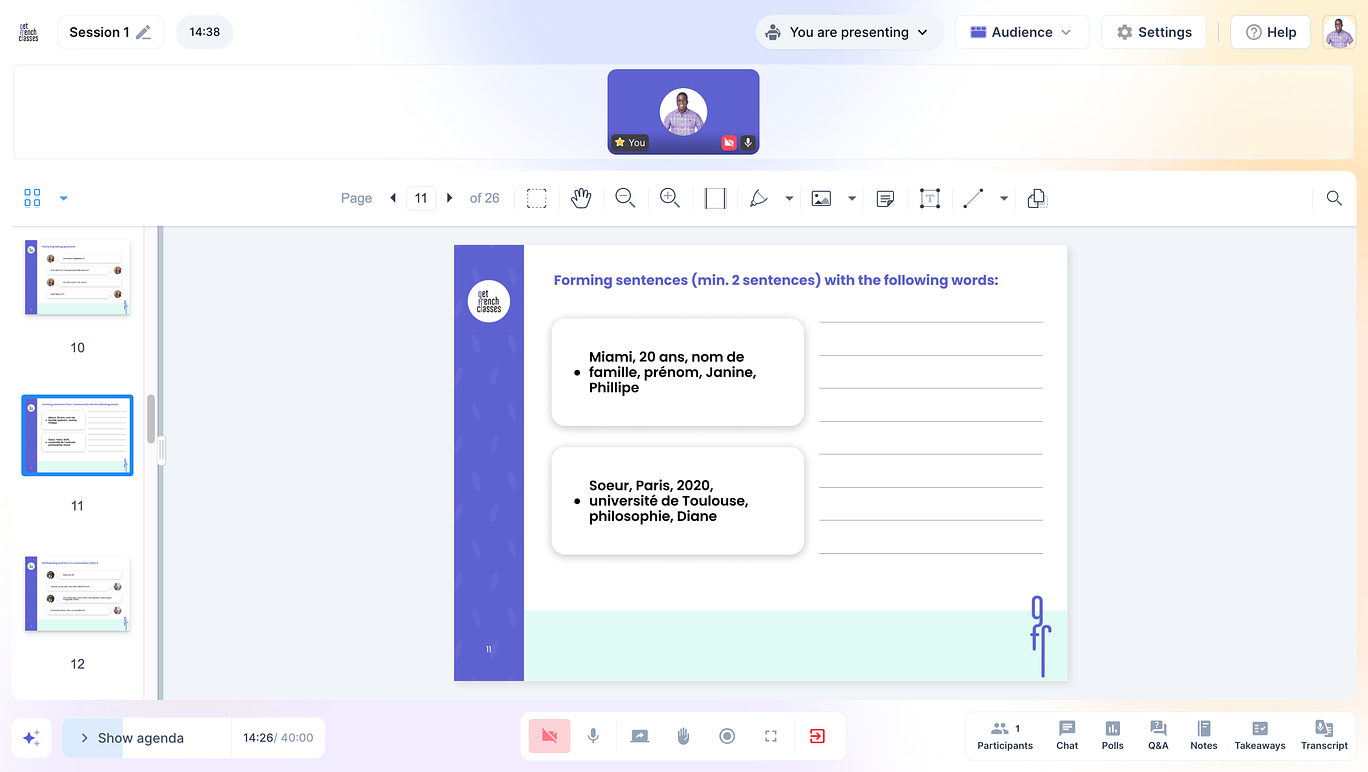
To reinforce your learning and track your progress, we provide daily assignments in various formats (written exercises, spoken tasks, and interactive activities). With these assignments, you'll develop your writing and speaking skills, apply new concepts, and more.
Furthermore, as a learner at Get French Classes , you'll have access to a wealth of French learning resources and materials, including video lessons, audio materials, reading texts, interactive exercises, and downloadable resources.
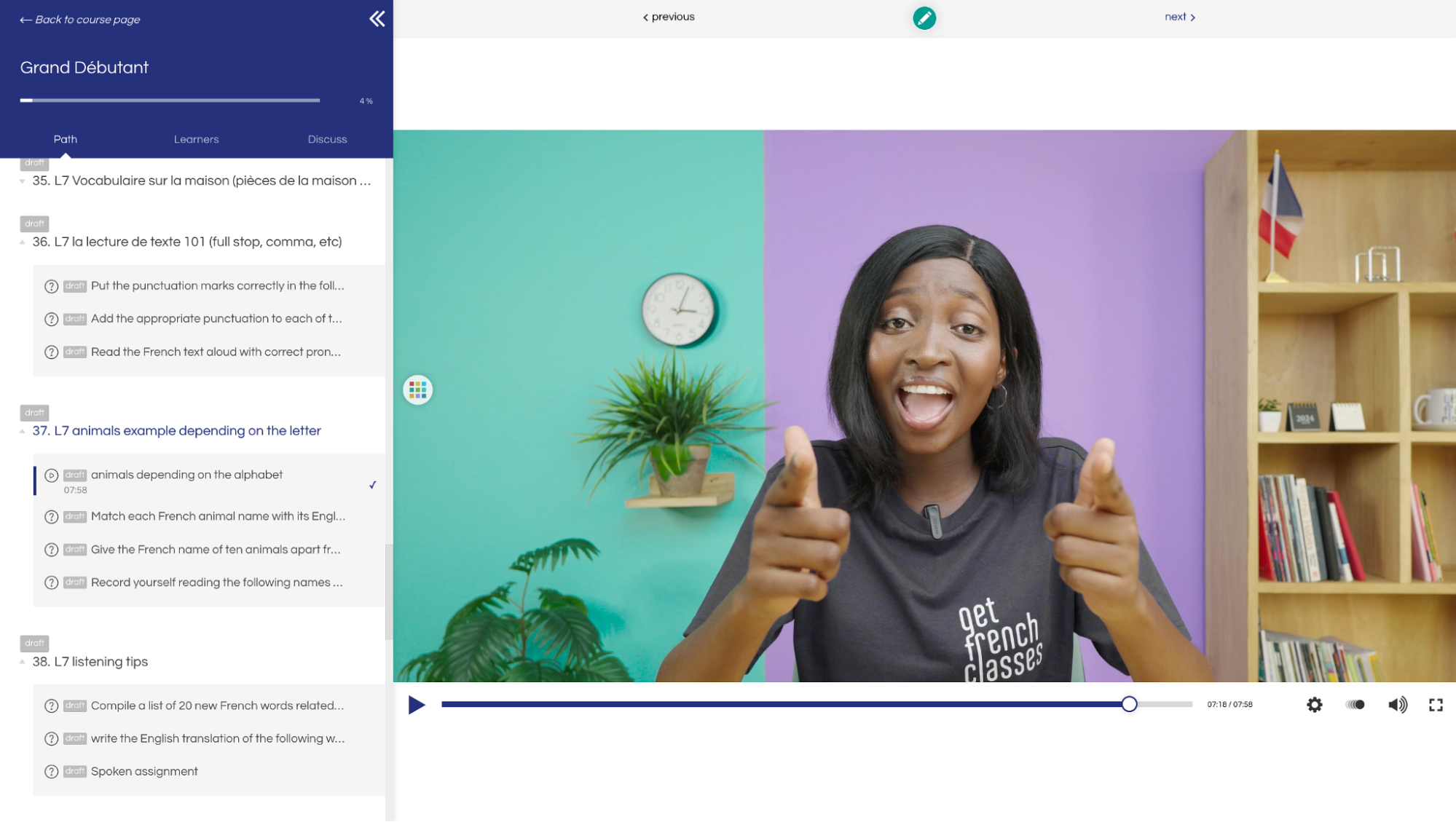
These materials cater to different learning preferences and proficiency levels. You can be sure you'll have everything you need to succeed in your French learning journey.
Overcoming the "I can understand but can't speak" problem in French learning requires a multi-faceted approach that addresses common mistakes, rewires your brain, and provides ample opportunities for speaking practice — and we are the best option if that's what you need.
We'll help you break through the barriers holding you back and achieve your goal of becoming a fluent and self-confident French speaker.
🇫🇷 Learn From Meghan's Mistakes!
Meghan spent months trying out techniques like vocabulary memorization, spaced repetition, and gamification apps like Duolingo. None of it worked, instead it ended up being total waste of time and money. She had a breakthrough only after discovering Get French Classes where she went through our active immersion, that helped her:
-
build the daily habits of speaking French,
-
practice under real-life scenarios through private French classes,
-
improve fluency through group classes with other French learners.
Join one of our French courses and start speaking French today.
Sources
-
How long does it take to speak French fluently? — French Lessons in Paris ).
-
What do you need to know to learn a foreign language? by Paul Nation
-
Harley, B., A. d’Anglejan and S. Shapson. (1990). The Evaluation Syllabus, National Core French Study. Winnipeg, MB: Canadian Association of Second Language Teachers.
-
Johnson, K. R., & Layang, T. V. J. (1996). On terms and procedures: Fluency. Behavior Analyst, 19(2), 281-288.
-
Kormos, J., & Dénes, M. (2004). Exploring measures and perceptions of fluency in the speech of second language learners. System: An International Journal of Educational Technology and Applied Linguistics, 32(2), 145-164.
-
Swain, M. (1972). “Bilingualism as a First Language.” Ph.D. dissertation. Irvine, CA: University of California at Irvine.
-
Zimmerman, B. J. (2002). Becoming a Self-Regulated Learner: An Overview. Theory into Practice, 41(2), 64-70.
